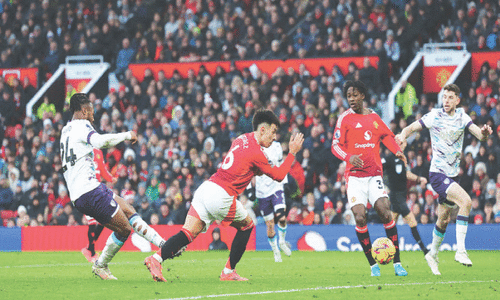PARIS: Having won the last three major international tournaments, it is worth wondering if reigning champions Spain might finally come a cropper at this World Cup.
Their remarkable run of success simply has to come to an end eventually, and there are concerns that their style of football -- epitomised by the ageing Xavi Hernandez -- is already outdated.
Spain followed the Barcelona way of playing to win the 2010 World Cup and Euro 2012. In the latter tournament, they ultimately triumphed in style, destroying Italy 4-0 in the final, but the sterile way in which they dominated earlier matches led many to label Vicente del Bosque's side boring.
Even if wasn't always thrilling, it was effective. But the two years since have witnessed the decline of the Pep Guardiola empire at Barcelona.
The Catalans' possession-based game, popularly known as 'tiki-taka', was made to look utterly one-dimensional as they were taken apart by Bayern Munich, all power and fast transitions from defence to attack, in the Champions League semi-finals in 2013.
Fast forward a year and Bayern, with Guardiola in charge, were playing the 'tiki-taka' and being torn apart on the counter-attack by Real Madrid at the same stage. Recently, as a result, it has become popular to mourn the death of that style.
Alternative ways of playing have emerged at club level. Borussia Dortmund's high-octane counter-pressing game took them to the 2013 Champions League final, while Atlitico Madrid have achieved extraordinary success with a 4-4-2 formation centred around defensive discipline, midfield industry and the brute attacking force of Diego Costa.
Jose Mourinho has taken things to extremes at times. His approach is often that if you willingly renounce possession you will make fewer mistakes and therefore win the game.
But to say that 'tiki-taka' is dead is to jump to conclusions. After all, until 2011, Guardiola's Barcelona mixed their mesmerising short passing with a crucial element, a high-energy pressing game. And Guardiola's Bayern won the double in Germany in the season just finished.
'Tiki-taka' can still succeed if played at the right tempo, and Spain are set to maintain the faith in a style that has served them so well previously.
“Why would we change? We've done very well with this style. There's no need to change it,” midfielder David Silva told British newspaper The Independent.
- Characterised by caution -
There are different ways to win matches, though, and all are valid. Playing with two forwards has become less commonplace in the last decade, and both the 4-2-3-1 and Barcelona's classic 4-3-3 with one central forward, or perhaps a false nine, will be prominent in Brazil.
Nevertheless, several Central and South American sides will play with two strikers, including Uruguay with Edinson Cavani and Luis Suarez, and Chile. The four-man defence will remain de rigueur, even if Mexico should favour a back five and Louis van Gaal has admitted that the loss of midfielder Kevin Strootman to injury could see the Netherlands abandon their 4-3-3 for a 5-3-2.
Van Gaal's seemingly last-minute change in policy is all the more remarkable given that modern World Cups tend to be characterised by the desire not to take risks.
The first FIFA World Cup Technical Study, of the 1966 finals in England, noted that “emphasis on defensive strength in team play is spreading throughout world football,” because “team coaches in modern competition cannot afford to lose.”
Fast forward to South Africa 2010, and FIFA noted that “the opening group matches were characterised by cautious play.”Things did improve, but the average goals per game for the entire tournament was just 2.27, the lowest ever except for Italy 1990 (2.21), while Spain were the lowest-scoring winners since the World Cup began.
In Brazil, given what is at stake, the emphasis should again be on caution and there will probably be little in terms of innovation from managers now.
“Teams that get to the World Cup arrive there via a process,” says Portugal coach Paulo Bento. “To qualify, this process must be successful. Therefore, I don't think it is likely that coaches will change processes in a short period of time when they have been prepared and worked on for so long.”














































Dear visitor, the comments section is undergoing an overhaul and will return soon.